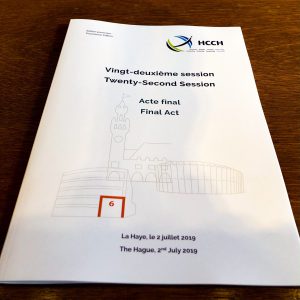Arbitrating Corporate Law Disputes: A Comparative Analysis of Turkish, Swiss and German Law
Written by Cem Veziroglu
Cem Veziroglu, doctoral candidate at the University of Istanbul and research assistant at Koc University Law School has provided us with an abstract of his paper forthcoming in the European Company and Financial Law Review.
Arbitrating Corporate Law Disputes: A Comparative Analysis of Turkish, Swiss and German Law
The resolution of corporate law disputes by arbitration rather than litigation in national courts has been frequently favoured due to several advantages of arbitration, as well as the risks related to the lack of judicial independence, particularly in emerging markets. While the availability of arbitration appears to be a major factor influencing investment decisions, and there is a strong commercial interest in arbitrating corporate law disputes, the issue is unsurprisingly debated in respect of certain characteristics of the joint stock company as a legal entity. Hence the issue comprises a series of legal challenges related to both corporate law and arbitration law.
In a paper forthcoming in the European Company and Financial Law Review, I tackle the arbitrability of corporate law disputes and the validity of arbitration clauses stipulated in the articles of association (“AoA”) of joint stock companies. The study compares Turkish law with that of Germany and Switzerland and in particular tries to shed light on the current position of Turkish law with respect to (i) arbitrability of corporate law disputes, such as validity of general assembly resolutions and requests for corporate dissolution, (ii) validity and binding nature of an arbitration clause provided in the AoA. The paper also suggests practicable legislative recommendations as well as a model arbitration clause.
Arbitrability of Corporate Law Disputes
Under Turkish law corporate law disputes are, in principle, considered to be arbitrable, whereas disputes concerning the validity of general assembly resolutions and corporate dissolution are still heavily debated. I argue that both types of disputes are arbitrable, albeit judicial dissolution requests accommodate practical hurdles due to the magnitude of remedial power granted to judges by law. Moreover, I suggest that arbitral awards should be granted an erga omnes effect (the effects exceeding the parties to the dispute), as long as the interested third parties are provided with the necessary procedural protection. These procedural mechanisms may include the pending and consolidation of all actions filed before the arbitral tribunal and collective – or impartial – selection of arbitrators in multy-party arbitral proceedings.
It seems that the case law has thus far followed the distinction adopted by the orthodox doctrine in general terms; namely disputes concerning the validity of general assembly resolutions and corporate dissolution are deemed inarbitrable. However, considering the ever-growing pro-arbitration tendency in Turkey –in parallel with many other jurisdictions– it would not be surprising if a more flexible approach is eventually adopted in case law as well.
Place of the Arbitration Clause: Articles of Association or Shareholders Agreement?
It is necessary to provide an arbitration clause in the AoA of the company, rather than a shareholders’ agreement (“SHA”), in order to (i) prevent contradicting judgments handed down in parallel proceedings, (ii) be able to request claims peculiar to corporate law and (iii) ensure the binding effect vis-à-vis the company, board members and new shareholders as well as the current shareholders.
Validity of an Arbitration Clause Provided in the AoA
There is no rule under Turkish corporate law that restricts contractual freedom within the AoA of privately held joint stock companies that has the effect of restraining arbitration clauses. An arbitration clause can, therefore, be validly provided either in the original AoA or by way of an amendment thereof by way of a unanimous vote. However, the binding effect of the arbitration clause in question depends on its legal nature, namely, ‘corporative’ or ‘formal’ (contractual).
Addressing this issue, the paper proposes to adopt a two-step test and concludes that if an arbitration clause stipulated in the AoA is deemed corporative in nature, the company, the board members, the new shareholders, and the current shareholders are bound by such an arbitration clause. In the event that the arbitration clause in question is deemed to be a formal provision, it may still remain effective only among the parties as a purely contractual term.
Policy Recommendations
The arbitrability of corporate law disputes, the validity of arbitration clauses stipulated in the AoAs and the procedural standards to protect third parties’ interests should be clarified by an explicit legal provision. In fact, Article 697n of the Swiss Draft Code of Obligations dated 23 November 2016[1] and Italian Legislative Decree of 17 January 2003 No. 5 Articles 34-37 may offer motivating examples in this respect.
According to German Federal Court’s decision in 2009[2], an arbitration clause in the AoA is valid, provided that the protections and the opportunity of shareholders to participate in the proceedings comparable to those in national court proceedings are respected. Therefore Turkish courts should examine the arbitration clause in question in terms of the protection provided to shareholders, rather than applying an outright ban on such clauses in the AoA.
The leading arbitration institutions should draft and publish rules for corporate law disputes as annexes to their existing rules of arbitration. These should consider the issues peculiar to corporate law disputes. Hence, they should provide such mechanisms as the pending and consolidation of actions filed before the arbitral tribunal; collective -or impartial- selection of arbitrators so as to provide the minimum legal procedural protection granted to shareholders. A comprehensive example is the German Arbitration Institution’s ‘DIS-Supplementary Rules for Corporate Law Disputes 09’[3].
With a view to facilitating the incorporation of applicable and valid arbitration clauses into the AoA, a model arbitration clause for corporate law disputes should be published by leading arbitration institutions. Such a model clause may be inspired by the draft model clause found in the paper referenced above.
[1] https://www.admin.ch/opc/fr/federal-gazette/2017/625.pdf.
[2] BGH, 6 April 2009, II ZR 255/08, BGHZ 180, 221.
[3] The said rules can be found at: http://www.disarb.org/en/16/rules/dis-supplementary-rules-for-corporate-law-disputes-09-srcold-id15.

